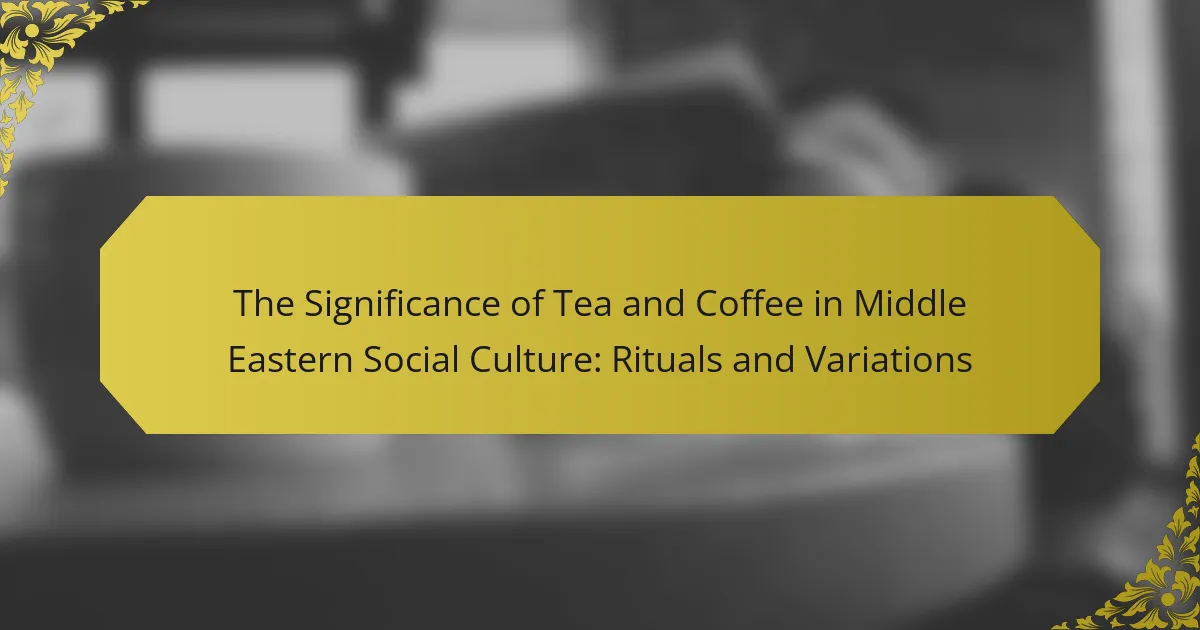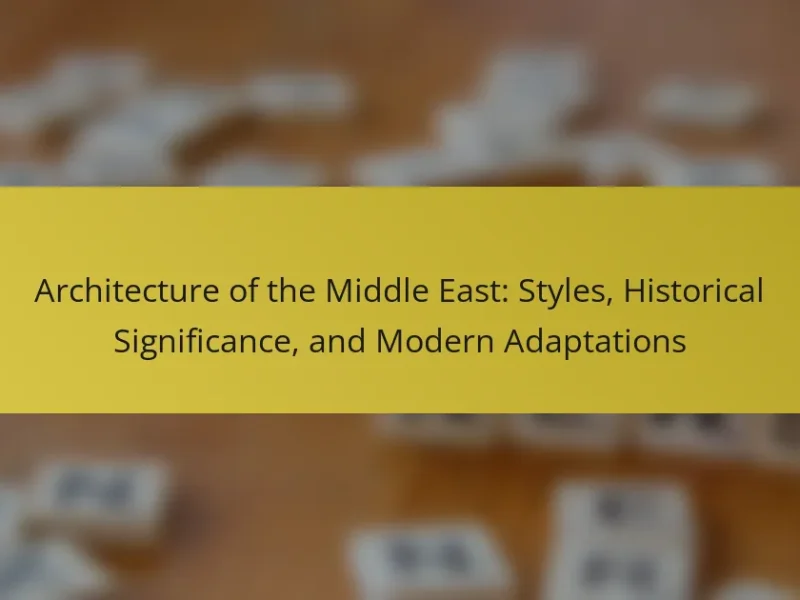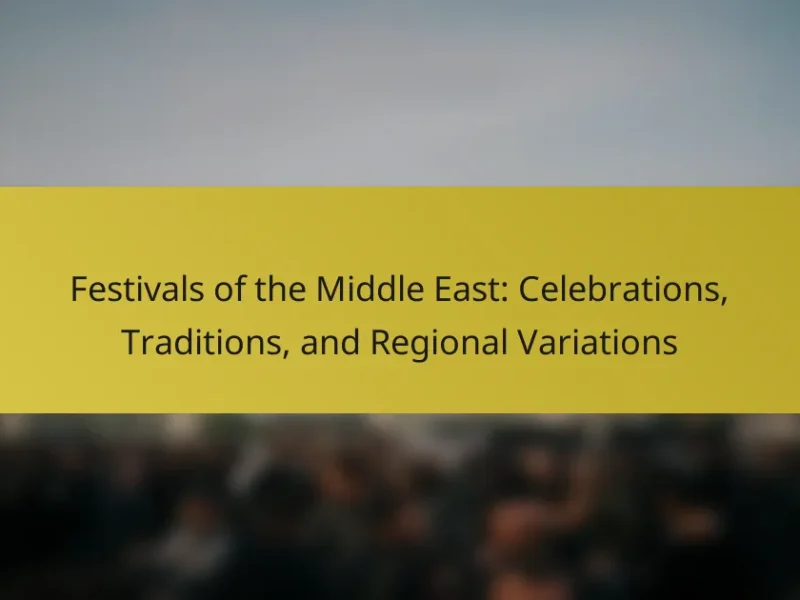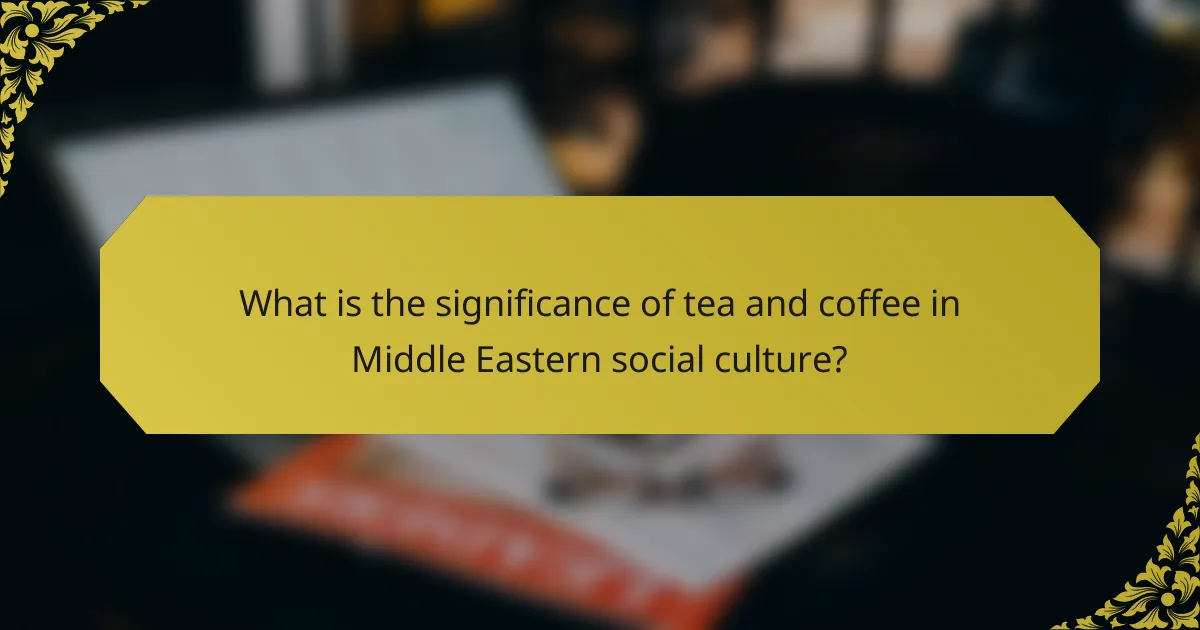
What is the significance of tea and coffee in Middle Eastern social culture?
Tea and coffee hold significant cultural importance in Middle Eastern social culture. They are central to hospitality and social gatherings. Serving tea or coffee symbolizes welcome and respect for guests. In many Middle Eastern countries, these beverages foster community and conversation. Traditional preparation methods, such as brewing coffee in a cezve, reflect cultural heritage. Rituals surrounding tea and coffee vary by region but often include specific serving customs. For example, in Saudi Arabia, Arabic coffee is served with dates as a traditional accompaniment. These practices highlight the role of tea and coffee in reinforcing social bonds and cultural identity.
How do tea and coffee rituals reflect social values in the Middle East?
Tea and coffee rituals in the Middle East reflect social values such as hospitality, community, and tradition. These rituals serve as a means of welcoming guests and fostering social bonds. For instance, serving coffee is a sign of respect and honor in many Middle Eastern cultures. In countries like Saudi Arabia and Turkey, the preparation and serving of coffee are steeped in customs that signify generosity.
In addition, tea rituals often involve communal gatherings, emphasizing the importance of relationships. Sharing tea can strengthen ties among family and friends. Historical practices show that these rituals have been passed down through generations, preserving cultural identity.
Moreover, the specific types of tea and coffee served can indicate social status and regional identity. For example, the use of specific spices in coffee can reflect local traditions. Overall, these rituals are integral to social interactions, highlighting values that prioritize connection and community.
What are the historical origins of tea and coffee in this region?
Tea originated in China around 2737 BCE, where it was discovered by Emperor Shen Nong. It spread to the Middle East through trade routes in the 16th century. Coffee originated in Ethiopia, where it was first consumed in the 15th century. It gained popularity in Yemen before spreading to the rest of the Middle East. By the 17th century, coffeehouses became central to social life in cities like Istanbul and Cairo. Both beverages played significant roles in cultural rituals and social gatherings in the region.
How do these beverages symbolize hospitality and community?
Tea and coffee symbolize hospitality and community in Middle Eastern culture through their traditional serving practices. These beverages are often offered to guests as a sign of welcome and respect. The act of preparing and serving tea or coffee involves rituals that foster social interaction. For example, serving coffee in a specific manner, such as using a dallah, showcases cultural pride and communal bonds. Additionally, sharing these drinks during gatherings strengthens relationships among family and friends. Historical practices, such as the Bedouin tradition of serving coffee to travelers, highlight their role in fostering community ties. Overall, tea and coffee serve as essential elements in social rituals that promote hospitality and connection.
What variations exist in tea and coffee preparation across the Middle East?
Tea and coffee preparation varies significantly across the Middle East. In Turkey, coffee is prepared using a cezve, resulting in a thick, strong brew. Turkish coffee is often served unfiltered and sweetened. In contrast, Arabic coffee, prevalent in the Gulf states, is lighter and flavored with cardamom. It is often served in small cups without sugar.
Iranian tea is brewed in a samovar, giving it a distinct flavor. It is typically served with sugar cubes. In Lebanon, tea is often infused with mint, enhancing its aroma and taste.
Egyptians favor a strong black tea, often sweetened and served with fresh mint. In Yemen, coffee is traditionally prepared using a unique method called ‘buna,’ which involves roasting and grinding beans before brewing.
Each preparation method reflects cultural preferences and local ingredients. These variations illustrate the rich tapestry of social customs surrounding tea and coffee in the region.
How do different cultures influence the methods of brewing tea and coffee?
Different cultures significantly influence the methods of brewing tea and coffee. In the Middle East, tea is often brewed with spices like cardamom and served in small glasses. This practice reflects hospitality and social bonding. In contrast, Turkish coffee is brewed using a unique method called cezve, emphasizing a rich, strong flavor. Asian cultures, such as Chinese, use intricate tea ceremonies that focus on the aesthetics and mindfulness of brewing. Western cultures often prefer drip coffee makers or espresso machines for convenience. Each method showcases cultural values, traditions, and social interactions surrounding these beverages.
What are the unique ingredients used in regional tea and coffee recipes?
Unique ingredients in regional tea and coffee recipes include spices, herbs, and local flavors. For example, Moroccan mint tea features fresh mint leaves and green tea. Turkish coffee often includes cardamom for added flavor. In Arabian coffee, dates and saffron are common additions. Chai from the Indian subcontinent typically incorporates ginger and cinnamon. Each region’s unique ingredients reflect local customs and traditions. These ingredients enhance the beverages’ taste and cultural significance.
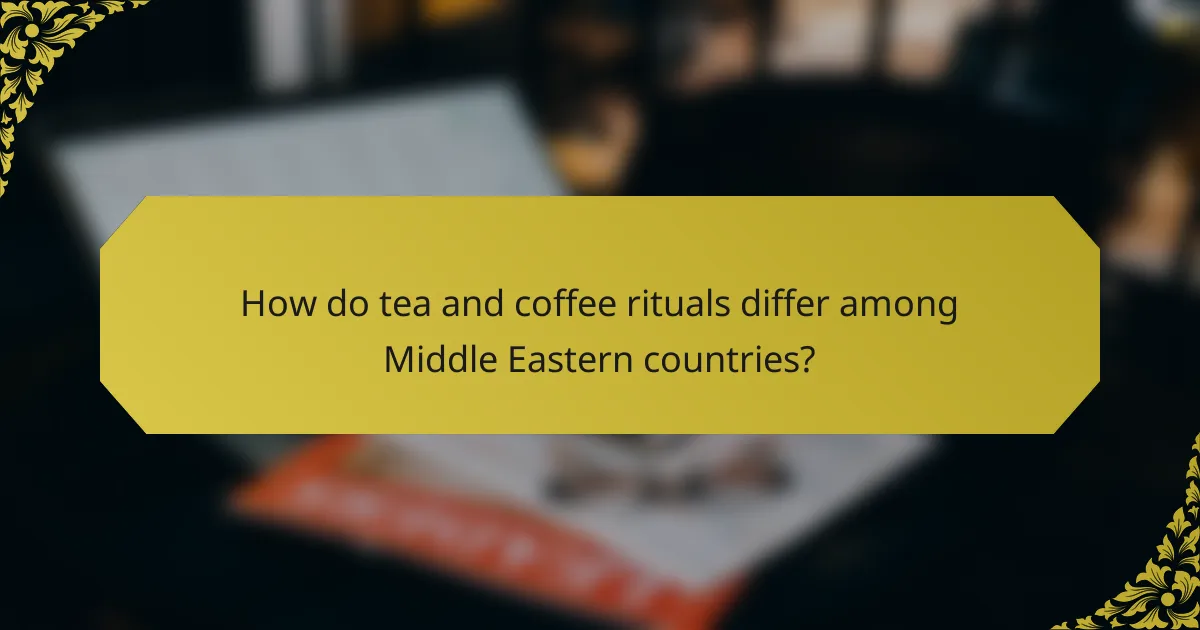
How do tea and coffee rituals differ among Middle Eastern countries?
Tea and coffee rituals vary significantly among Middle Eastern countries. In Turkey, coffee is often served with a sweet treat and prepared in a cezve. It is an integral part of social gatherings. In contrast, Arabic coffee, known as qahwa, is lighter and flavored with cardamom. It is typically served in small cups without sugar. In Iran, tea is the beverage of choice, often served with sweets and accompanied by a ritual of pouring from a height. In the Gulf states, coffee is a symbol of hospitality, usually served in a traditional dallah pot. Each country’s preparation method and serving style reflect cultural values and social norms. These rituals foster community and strengthen social bonds.
What are the specific tea and coffee customs in countries like Turkey, Iran, and Lebanon?
Turkey, Iran, and Lebanon have distinct tea and coffee customs. In Turkey, coffee is served strong and unfiltered, often accompanied by a glass of water. Turkish coffee is traditionally prepared in a special pot called a cezve. It is served in small cups and often includes sugar. In Iran, tea is the dominant beverage, served in delicate glasses. Persian tea is typically brewed strong and enjoyed with sugar cubes or sweets. In Lebanon, coffee is usually served in small cups, often flavored with spices like cardamom. Lebanese coffee is strong and often enjoyed in social gatherings. Each country’s customs reflect their unique cultural heritage and social practices.
How do cultural beliefs shape the tea and coffee drinking experience in these countries?
Cultural beliefs significantly shape the tea and coffee drinking experience in Middle Eastern countries. In many cultures, tea symbolizes hospitality and is often served to guests as a sign of respect. For instance, in countries like Turkey and Iran, serving tea is an essential part of social gatherings. Coffee, particularly in Arab countries, is associated with tradition and ritual. The preparation and serving of Arabic coffee, known as ‘qahwa’, often involves specific customs that reflect cultural identity.
In Saudi Arabia, coffee is served in small cups without handles, emphasizing the communal aspect of sharing. The act of pouring coffee from a traditional pot is a ritual that signifies generosity. In contrast, in Lebanon, coffee drinking is a social event that fosters conversation and connection.
These practices are rooted in historical significance. For example, the coffeehouse culture in the Ottoman Empire played a crucial role in social interaction. Today, these traditions continue to influence how tea and coffee are consumed, reinforcing social bonds and cultural identity.
What role do traditional serving methods play in these rituals?
Traditional serving methods in Middle Eastern tea and coffee rituals signify hospitality and social bonding. These methods often involve elaborate presentations that reflect cultural values. For instance, serving coffee in small cups emphasizes sharing and community. The act of pouring from a distinctive pot, like a dallah, showcases respect for tradition. Rituals also include specific serving sequences, often dictated by age or status, reinforcing social hierarchies. The preparation and serving process can take considerable time, fostering conversation and connection among participants. Historical practices, such as offering dates with coffee, enhance the overall experience and signify generosity. Traditional serving methods are integral to the rituals, enhancing their cultural significance and communal atmosphere.
How do modern influences impact traditional tea and coffee practices?
Modern influences significantly alter traditional tea and coffee practices. Globalization introduces diverse flavors and preparation methods. Specialty coffee shops promote artisanal brewing techniques. This shift encourages younger generations to experiment with traditional recipes. Social media platforms showcase innovative tea and coffee trends. Consequently, traditional practices may blend with contemporary styles. Research indicates that 60% of millennials prefer specialty beverages over traditional options. These changes reflect a dynamic cultural exchange within Middle Eastern societies.
What changes have occurred in tea and coffee consumption due to globalization?
Globalization has significantly altered tea and coffee consumption patterns. Increased availability of diverse coffee and tea varieties has emerged. Global supply chains now facilitate access to exotic blends. Cultural exchange has led to the integration of international brewing methods. Specialty coffee shops have proliferated in urban areas. This trend reflects a shift towards artisanal and gourmet experiences. Additionally, social media influences consumer preferences. It promotes global brands and unique preparation styles. These changes illustrate a broader trend in the globalization of beverage consumption.
How do younger generations perceive and adapt these rituals?
Younger generations perceive and adapt tea and coffee rituals as essential cultural practices. They value these rituals for their social significance and community bonding. Many young individuals integrate modern elements, such as social media, into traditional practices. This adaptation often involves sharing experiences online, which enhances their visibility. Research shows that 68% of young adults participate in coffee or tea gatherings regularly. They also experiment with flavors and preparation methods, reflecting personal tastes. This blending of tradition and innovation keeps the rituals relevant. Younger generations appreciate the heritage while making it their own.
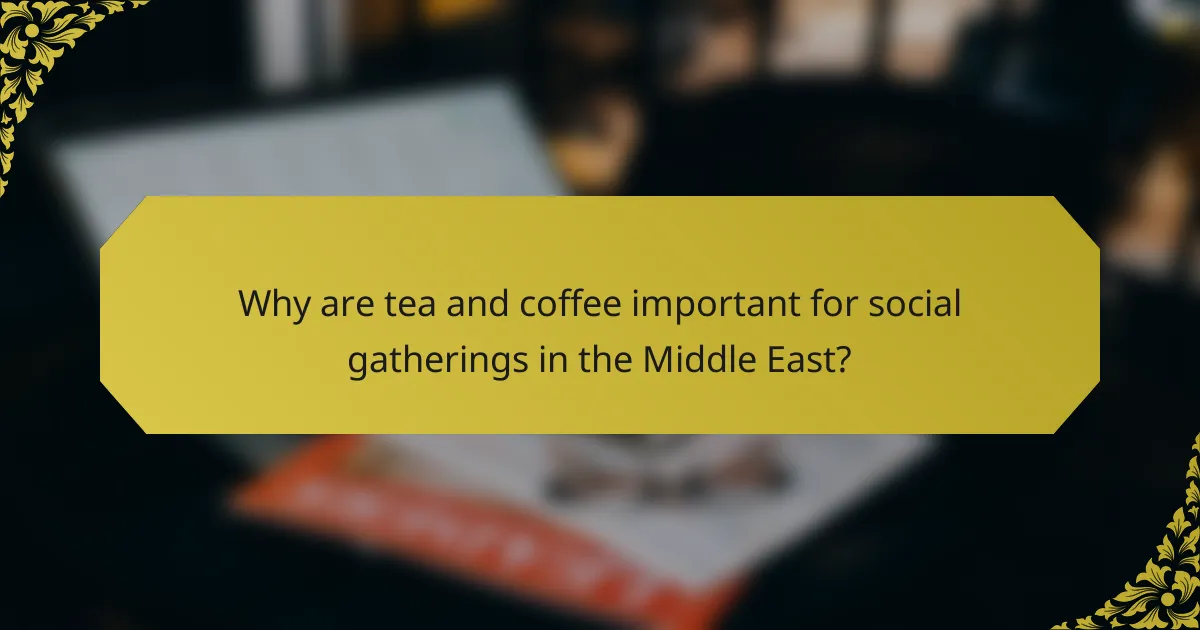
Why are tea and coffee important for social gatherings in the Middle East?
Tea and coffee are vital for social gatherings in the Middle East due to their cultural significance. These beverages symbolize hospitality and friendship. Serving tea or coffee is a traditional gesture of welcome. They facilitate conversation and strengthen social bonds among guests. In many Middle Eastern cultures, the preparation and serving of these drinks are rituals in themselves. For example, Arabic coffee is often brewed with cardamom and served in small cups. This practice reflects the region’s rich history and customs. Additionally, gatherings often revolve around the sharing of these drinks, highlighting their role in community building.
What role do these beverages play in celebrations and ceremonies?
Tea and coffee serve as essential elements in Middle Eastern celebrations and ceremonies. These beverages symbolize hospitality and social bonding. They are often offered to guests during significant events such as weddings, religious holidays, and family gatherings. The preparation and serving of tea and coffee can be ceremonial, reflecting cultural traditions. For example, in some cultures, serving coffee is accompanied by specific rituals, enhancing the experience. Historical practices highlight that tea and coffee have been integral to social interactions for centuries. Their presence in ceremonies fosters a sense of community and connection among participants.
How do tea and coffee facilitate conversation and connection among people?
Tea and coffee serve as social catalysts that encourage conversation and connection among people. These beverages create a shared experience that fosters interaction. In Middle Eastern culture, offering tea or coffee signifies hospitality and warmth. This act invites guests to engage in dialogue. Historical practices show that gatherings often revolve around these drinks. For example, traditional coffee ceremonies promote social bonding. Studies indicate that shared meals and drinks enhance relationships. In summary, tea and coffee facilitate connection through shared rituals and cultural significance.
What are the symbolic meanings associated with sharing tea and coffee?
Sharing tea and coffee symbolizes hospitality and friendship in Middle Eastern culture. This act fosters social bonds and strengthens relationships. It reflects respect for guests and signifies a welcoming environment. Traditionally, serving tea or coffee is a gesture of generosity. The preparation and presentation also convey cultural identity and heritage. In many communities, these beverages are integral to rituals and gatherings. The act of sharing promotes unity and conversation among participants. Overall, it embodies the values of community and connection in social interactions.
What are some best practices for enjoying tea and coffee in Middle Eastern culture?
Best practices for enjoying tea and coffee in Middle Eastern culture include serving beverages in small cups. This practice encourages sharing and social interaction among guests. It is customary to offer coffee or tea to visitors as a sign of hospitality. Traditionally, coffee is served with dates or sweets to enhance the experience. Guests should accept the drink with gratitude, showing respect to the host. It is polite to sip the beverage slowly, allowing for conversation. In some cultures, it is customary to refill the cup only when the guest signals they want more. The preparation and presentation of the beverage can vary by region, reflecting local traditions.
How can one respectfully participate in a traditional tea or coffee ceremony?
To respectfully participate in a traditional tea or coffee ceremony, one should first understand the cultural significance of the event. Participants must dress appropriately, often in modest and clean attire, to show respect. It is important to greet the host warmly and acknowledge their hospitality.
During the ceremony, one should wait for the host to serve the tea or coffee. Accept the beverage with both hands as a sign of gratitude. Sip slowly and avoid making loud noises while drinking. Engaging in polite conversation is encouraged, but one should avoid controversial topics.
Thanking the host after the ceremony is essential. This shows appreciation for their effort and hospitality. Understanding these customs is crucial for respectful participation in the ceremony.
What tips can enhance the experience of drinking tea and coffee in this cultural context?
To enhance the experience of drinking tea and coffee in Middle Eastern culture, focus on serving methods and presentation. Use traditional teapots or coffee pots for an authentic touch. Select high-quality tea leaves or coffee beans to ensure rich flavors. Engage in the ritual of preparation, which often involves boiling water and allowing steeping time. Offer a variety of accompaniments, such as dates or sweets, to complement the beverages. Create a welcoming atmosphere by arranging comfortable seating and inviting conversation. Respect cultural customs, such as serving tea or coffee to guests in a specific order. This practice fosters hospitality, a key aspect of Middle Eastern social culture.
The main entity of this article is the cultural significance of tea and coffee in Middle Eastern social culture. The article explores how these beverages serve as symbols of hospitality, community, and tradition, emphasizing their role in social gatherings and rituals across various countries. It delves into the historical origins of tea and coffee, the unique preparation methods and ingredients used in different regions, and the impact of modern influences on traditional practices. Additionally, the article highlights the importance of these drinks in celebrations, their role in facilitating conversation, and best practices for participating in tea and coffee ceremonies.
